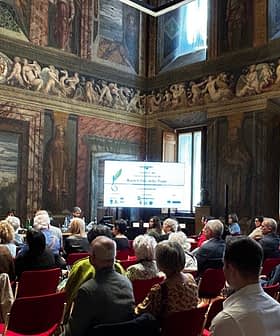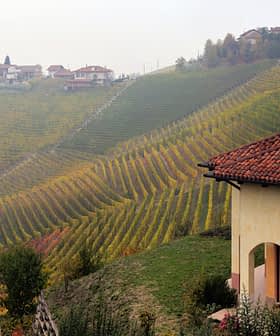Finalists for Oleotourism Contest Announced
At the third edition of the national competition, farmhouses and olive oil producers compete to propose tourism experiences in breathtaking locations.
 (Photo: Gino Di Paolo)
(Photo: Gino Di Paolo) Oleotourism in Italy is increasingly promoted through sensorial and well-being experiences meant to link extra virgin olive oil to where it is produced.
A set of 21 olive oil-based experiences have been selected as finalists at the third edition of the annual oleotourism competition organized by Città dell’Olio. The association includes more than 400 olive-growing municipalities in Italy and is sponsored by the Ministry of the Ecological Transition.
(Oleotourism produces) better and innovative tourism, where it becomes a means for protecting and safeguarding landscapes while supporting the rural economy.
According to judges, the competition’s finalists demonstrate how the sector has evolved in the last three years following the passage of Italy’s oleotourism law.
“Through the years, we have seen how olive oil-focused touristic proposals have evolved toward experience-based opportunities, following emerging trends,” Roberta Garibaldi, author of the Report on Wine and Food Tourism in Italy and president of the competition’s jury, told Olive Oil Times.
See Also:Farms in Italy Welcome an Uptick in Agritourism as Challenging Harvest Gets UnderwayFor many of the finalists, olive oil tourism intertwines with well-being experiences. For example, Garibaldi cited the Olivum Experience from the award-winning Palazzo di Varignana resort in the heart of the northern Emilia-Romagna region.
“It offers the opportunity to combine olive oil-based treatments with tastings of the company’s extra virgin olive oils,” Garibaldi said.
During the experience, a multi-course dinner is cooked for visitors, allowing them to taste the different extra virgin olive oils their host produces with each dish.
“We are seeing a number of opportunities for forest and nature bathing and walks through the olive groves to be experienced in silence, to remove oneself from the hectic pace of daily life, regenerate and recover at one’s own pace,” Garibaldi said.
“Well-being is also promoted through active experiences such as trekking and bicycle or mountain bike tours,” she added.
Garibaldi further emphasized how these experiences allow tourists to discover more of the landscapes where olive oil is produced and are often neglected by traditional touristic routes.
“We have studied tours that allow tourists to ride a bicycle and reach the most interesting olive-related communities,” Daniela Montalbano, a contest finalist in central Italy with her Abruzzo Live Experience, told Olive Oil Times.
“Tourists get to know the producers, take part in olive oil-focused dinners and explore olive museums,” she added. “By passing from one location to the next in Abruzzo, they can taste extra virgin olive oils produced from local cultivars, such as Intosso, and compare it to other cultivars.”
“Our region, Abruzzo, has seven rural historical landscapes listed in the national registry, more than Tuscany,” Montalbano continued. “Those landscapes can be traveled by bicycle. While you ride, you are looking at a monument that is part of our intangible heritage.”
Montalbano said oleotourism produces “better and innovative tourism, where it becomes a means for protecting and safeguarding landscapes while supporting the rural economy.”
Another of the finalists is the Civic Museums Foundation in Loreto Aprutino, located in the heart of Abruzzo’s olive oil-producing landscape. The history surrounding olive oil production is crucial to the tourist experience.
“One of the museums we manage is the olive oil museum,” Vincenzo de Pompeis, president of the foundation, told Olive Oil Times. “It is a late 19th-century olive mill, a rare jewel due to a very special resident, a highly educated and enlightened agricultural entrepreneur, Raffaele Baldini-Palladini.”
See Also:Officials in Castilla-La Mancha Look to Oleotourism to Boost Farmer IncomesThe mill, shaped like a castle, was designed by the famous local artist Francesco Paolo Michetti. Anticipating the needs of the emerging middle class, Baldini-Palladini sought to enhance olive oil quality by making the process more hygienic.
“At the time, olive oil grinders and artifacts were still powered by animals, and they usually lived in the same rooms where olive oil was produced,” de Pompeis said. “Baldini-Palladini built different living spaces for the animals, which were brought into the mill to power the grinders.”
Visitors can now explore the mill, see the innovations introduced over many decades by the founder’s descendants, look at unique historical pieces of furniture designed for the mill and study the marketing materials produced by Michetti for promoting olive oil. “Here, tourists can breath the soul of time,” de Pompeis said.
Garibaldi said many finalists allow tourists to participate in olive oil production, such as taking part in the olive harvest or assisting with milling operations.
Still, tastings, exploring the territory and getting in touch with the producers and their history are not the only elements of the emerging oleotouristic sector in Italy.
“Looking at all of the experiences in the last edition of the national competition, we can see a strong focus on sustainability,” Garibaldi said. “Small extra virgin olive oil producers are increasingly taking part in the contest, which also shows how a sense of responsibility about the heritage of which they are custodians and ambassadors is growing among them.”
“Another emerging trait is digital technologies. Among the finalists is the multimedia tour set up by the Frantoio di San Giminiano, a well-known Tuscan olive oil mill,” she added. “The tour is enriched by multi-touch tables and virtual reality stations which provide tourists a novel playful and engaging approach to learning more about olive oil and its culture.”
Since its foundation, Garibaldi said the competition has “mapped and collected more than 350 experiences in Italy, giving them visibility and increasing both operator and tourist awareness on its website.”
She added that small olive oil producers looking to design new oleotouristic opportunities should focus on three main steps.
“The first is research, to know the market and the tourist and to craft experiences capable of appealing to the public,” Garibaldi said.
“The second is being part of the network; cooperating with the producers and the associations in their regions, and with the food and wine touristic operators, to design innovative experiences and opportunities and to build co-marketing initiatives,” she added.
“The third is to communicate their idiosyncrasies and experiences through engaging narratives such as storytelling,” Garibaldi concluded. “And to monitor the results, gathering data on their visitors. This is crucial to understand what the tourists are looking for and to meet their needs.”








